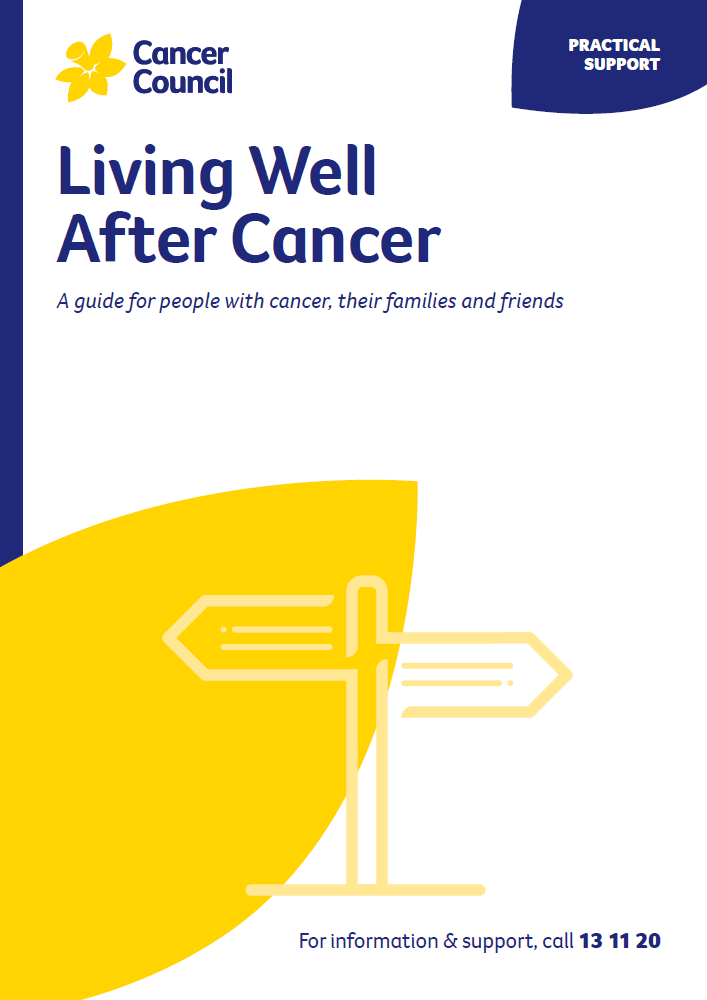- Home
- Bowel cancer
- Life after treatment
Life after treatment for bowel cancer
For most people, the cancer experience doesn’t end on the last day of treatment. Life after cancer treatment can present its own challenges. You may have mixed feelings when treatment ends, and worry that every ache and pain means the cancer is coming back.
Learn more about:
For your community
Overview
Some people say that they feel pressure to return to “normal life”. It is important to allow yourself time to adjust to the physical and emotional changes, and establish a new daily routine at your own pace. Your family and friends may also need time to adjust.
Cancer Council 13 11 20 can help you connect with other people who have had bowel cancer, and provide you with information about the emotional and practical aspects of living well after cancer.
Learn more about living well after cancer.
Follow-up appointments
After treatment ends, you will have regular appointments to monitor your health, manage any long-term side effects and check that the cancer hasn’t come back or spread. You will usually have a physical examination and you may have blood tests (including checking CEA levels), scans and colonoscopies. You will usually have a follow-up colonoscopy a year after the colonoscopy that showed bowel cancer. However, this may be sooner if only part of the bowel was seen during the last colonoscopy.
Check-ups may become less frequent if you have no further problems. Between follow-up appointments, let your doctor know immediately of any symptoms or health problems. Don’t wait for your next appointment. When a follow-up appointment or test is approaching, many people find that they think more about the cancer and may feel anxious. Talk to your treatment team or call Cancer Council 13 11 20 if you are finding it hard to manage this anxiety.
Dealing with feelings of sadness
If you have continued feelings of sadness, have trouble getting up in the morning or have lost motivation to do things that previously gave you pleasure, you may be experiencing depression. This is quite common among people who have had cancer.
Talk to your GP, because counselling or medication – even for a short time – may help. Some people can get a Medicare rebate for sessions with a psychologist. Cancer Council may also run a counselling program in your area.
For information about coping with depression and anxiety, call Beyond Blue on 1300 22 4636. For 24-hour crisis support, call Lifeline 13 11 14.
Cancer webinars
Watch our cancer webinars for information and insights that can help with the challenges you may face now that treatment is finished.
Looking after yourself
Cancer can cause physical and emotional strain, so it’s important to look after your wellbeing. Cancer Council has free booklets and programs to help you during and after treatment.
Call 13 11 20 to find out more, or see Managing cancer side effects, Exercise after a cancer diagnosis, Complementary therapies, Emotions and cancer, Nutrition and cancer, Sexuality, intimacy and cancer, Fertility and cancer, LGBTQI+ people and cancer and Living well after cancer.
Alternative therapies are therapies used instead of conventional medical treatments. These are unlikely to be scientifically tested, may prevent successful treatment of the cancer and can be harmful. Cancer Council does not recommend the use of alternative therapies as a cancer treatment.
If bowel cancer returns
For some people, bowel cancer does come back after treatment, called a recurrence. Regular check-ups are important so if cancer comes back, it can be found early. If the recurrence is only in the bowel and nearby lymph nodes, you may be able to have surgery to remove the cancer.
If bowel cancer has spread beyond the bowel (advanced or metastatic bowel cancer), you may be offered treatment, such as surgery, chemotherapy, targeted therapy, immunotherapy or radiation therapy. These treatments may remove the cancer, help control its growth and relieve symptoms. If your bowel becomes blocked, you will need urgent treatment.
Find information on living well after cancer in Arabic, Greek, Simplified and Traditional Chinese, and Vietnamese.
Watch this video to see why eating well is so important after a cancer diagnosis, and what you can do to maintain a healthy diet.
Go to Settings ![]() to turn on auto-generated subtitles in your language.
to turn on auto-generated subtitles in your language.
Research shows that exercise benefits people with cancer during and after treatment. Find out more in this video or see our other exercise videos.
Go to Settings ![]() to turn on auto-generated subtitles in your language.
to turn on auto-generated subtitles in your language.
More resources
Prof Alexander Heriot, Colorectal Surgeon and Director Cancer Surgery, Peter MacCallum Cancer Centre, Director, Lower GI Tumour Stream, Victorian Comprehensive Cancer Centre, VIC; Dr Cameron Bell, Gastroenterologist, Royal North Shore Hospital, NSW; Graham Borgas, Consumer; Prof Michael Bourke, Director of Gastrointestinal Endoscopy, Westmead Hospital, The University of Sydney, NSW; Laura Carman, 13 11 20 Consultant, Cancer Council Victoria, VIC; Amanda Connolly, Specialist Bowel Care Nurse, Icon Cancer Centre Windsor Gardens, SA; A/Prof Melissa Eastgate, Operations Director, Cancer Care Services, Royal Brisbane and Women’s Hospital, QLD; Anne Marie Lyons, Stomal Therapy Nurse, Concord Repatriation General Hospital and NSW Stoma Ltd, NSW; Lisa Nicholson, Manager Bowel Care Services, Bowel Cancer Australia, NSW; Stefanie Simnadis, Clinical Dietitian, St John of God Subiaco Hospital, WA; Rafi Sharif, Consumer; Dr Kirsten van Gysen, Radiation Oncologist, The Nepean Cancer and Wellness Centre, NSW; Sarah Williams, Clinical Nurse Consultant, Lower GI, Peter MacCallum Cancer Centre, VIC.
View the Cancer Council NSW editorial policy.
View all publications or call 13 11 20 for free printed copies.

